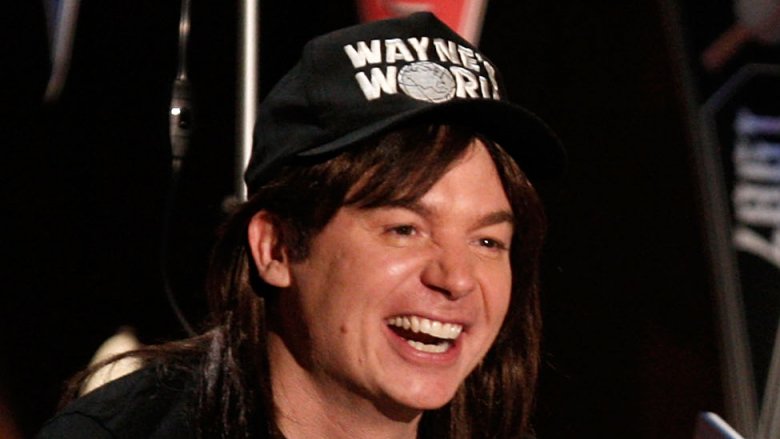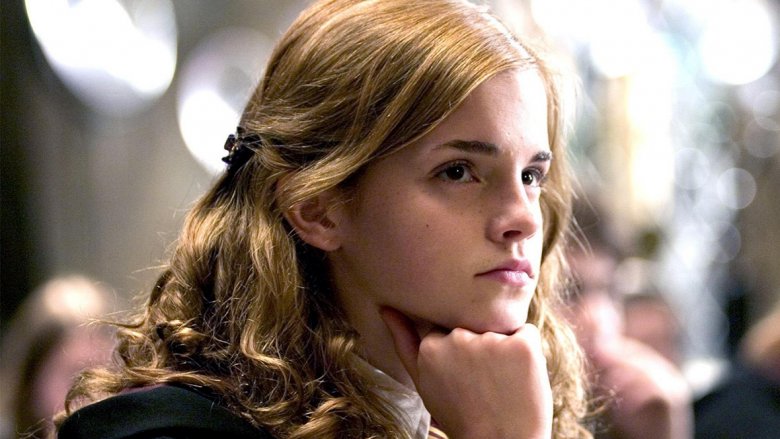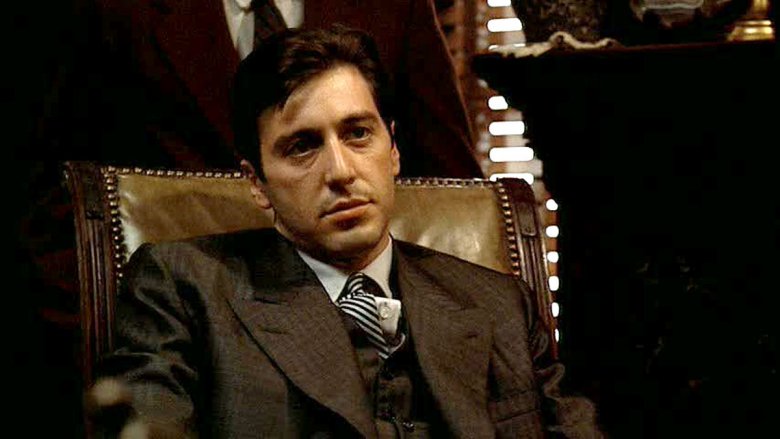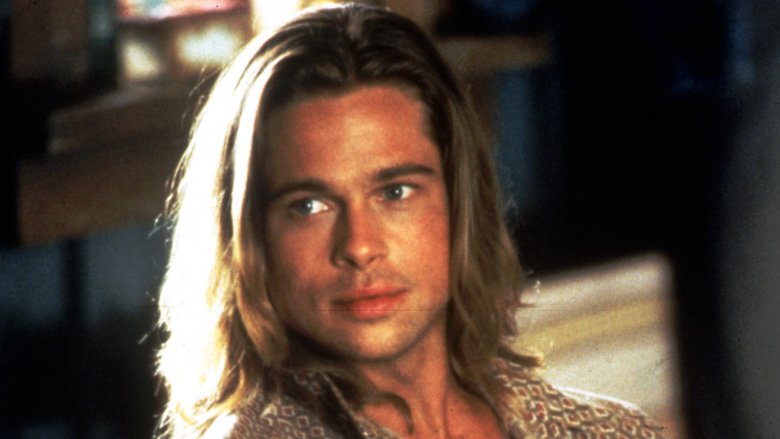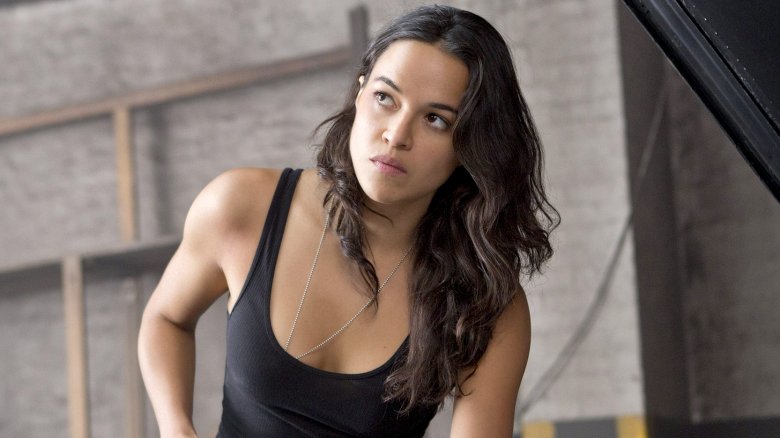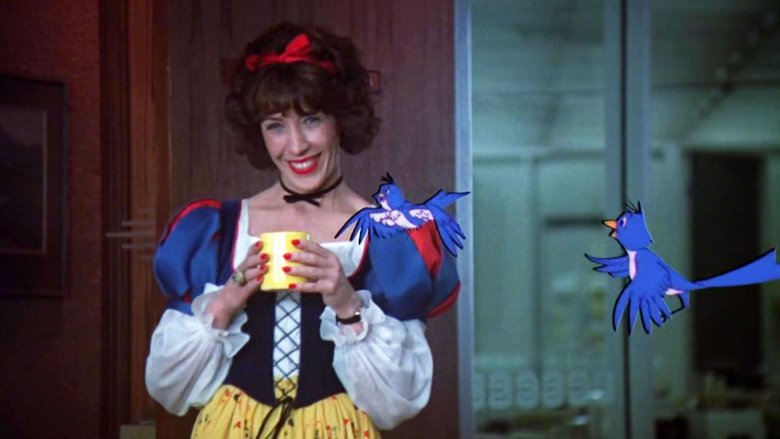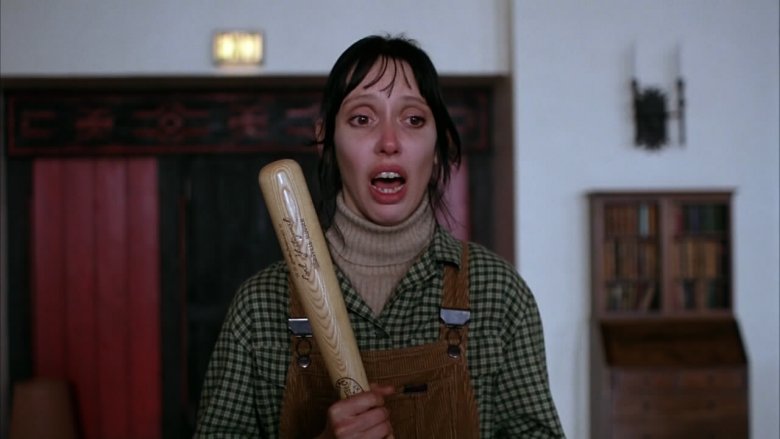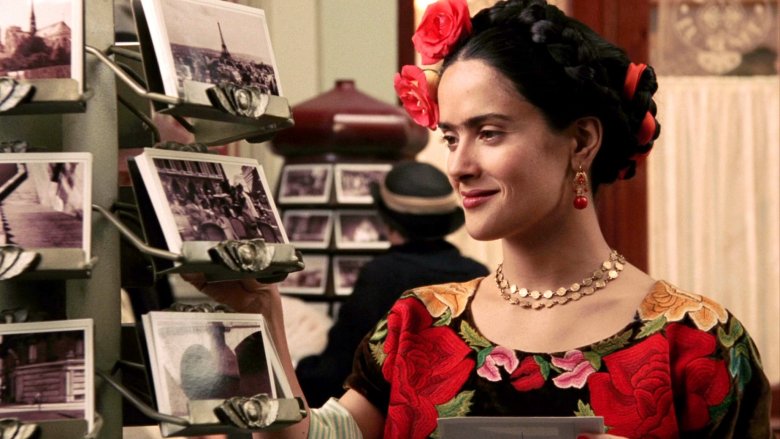Actors Who Threatened To Quit Their Famous Role
We may receive a commission on purchases made from links.
Most of us have held at least one soul-sucking job in our lives — you know, the kind that takes the Sunday Scaries to an entirely new level and leaves you crying in the bathroom at least once a day, desperate to ditch out and never come back. Luckily, there's always that option. You can quit, land a new gig, and all that remains are distant memories of your darkest work days ever.
Movie stars, not so much. Bailing for them is more complicated than simply yelling "I'm outta here!" There are the potential lawsuits, big financial penalties, and the PR nightmare of being labeled a "diva" or "difficult" — or worse of all, "unstable." All of which is why — even if they dread going to set, sob in their trailer on the daily, and obsess about escaping — actors usually end up toughing it out.
Before you pull out your tiny violin, think of it this way: An actor's miserable job is being recorded for posterity. For everyone to see. Forever. Talk about PTSD. Wonder if that's how these stars feel whenever Netflix decides to throw the movies that brought them to the brink of quitting back into rotation?
Goodbye everybody, Mike Myers has got to go (if it's Guns N' Roses)
Wayne's World was filmed on a relatively modest budget in 34 days, and is still the only movie inspired by a Saturday Night Live skit that's grossed over $100,000,000. Filming must've been a blast for Mike Myers, who conceived of the character as a preteen, debuted it on a Canadian variety show, and perfected it on SNL with cast member Dana Carvey as sidekick Garth, right? Well, not always.
It seems Myers had written the scene where Wayne and his friends are belting out Queen's "Bohemian Rhapsody" in an AMC Pacer as an homage to his teenage years. He felt the song was "inherently comedic" and loved the thought of living out his memories of fighting over who got to sing "Galileo" when, headbanging during the instrumental break, and warbling the word "Beelzebub" to film.
But director Penelope Spheeris had different ideas. The operatic tune seemed like an odd pick to her, so she suggested a Guns N' Roses metal anthem instead. Myers put his foot down and threatened to quit if Queen was cut. In the end, Myers won, the scene became iconic, and "Bohemian Rhapsody" returned to the Billboard charts nearly 20 years after its debut. Schwing!
Jim Carrey's costume stink, stank, stunk!
You know what made Jim Carrey even Grinchier as the character he was playing? The elaborate costume made of itchy green yak hair, extensive facial prosthetics, and yellow contacts that appeared as big as Frisbees and reportedly felt like "knives in the eye."
The first day on the set of The Grinch, Carrey's makeup took a full eight and a half hours to apply. After, he went back his trailer, kicked a hole in the wall, and told director Ron Howard he couldn't do the movie. In an interview on The Graham Norton Show, he called the experience "horrifying" and compared wearing the costume to being "buried alive."
Carrey was only persuaded to stay when an instructor who'd assisted CIA operatives to withstand torture was brought in to teach him how to deal with the daily three-hour process of getting into costume. The key lesson was in pain deferment, and the actor often punched himself in the leg if he was having a particularly hard time. Carrey remembers the hundred days spent in the costume as a "real lesson in zen...it's amazing what humans can endure."
In the end, it seems the torture was well worth it: The Grinch earned more than $345 million in worldwide box office sales, making it the second-highest-grossing Christmas movie of all time.
Emma Watson should have been sorted into Ravenclaw, not Gryffindor
Emma Watson landed the role of Hermione Granger in Harry Potter and the Sorcerer's Stone at age nine, and quickly became a fan favorite in the long-running franchise for her layered portrayal of the strong, confident, capable character. But when Watson's contract came up for renewal as the fifth installment of the series was being shot, rumors swirled that she was ready to quit.
The problem? Being in the Harry Potter films wasn't going to leave Watson time for a college education, something she was 100 percent committed to pursuing. In fact, the original schedule wouldn't have even left time to sit for her A-levels, the UK equivalent of AP exams. That was a hard no from Watson, even though she knew the decision might make her "public enemy number one."
Luckily, the studio totally reworked the shoot to accommodate Watson's educational aspirations. Fast forward to the happy ending: She continued to play the beloved character in final three films and earned a degree in English literature from Brown University.
Just when Al Pacino thought he was out, they pulled him back in
The Godfather is often referred to as the greatest movie of all time. Over the years, the mafia classic has grossed nearly $135 million; when adjusted for inflation, that places it at number 25 for all-time box office grosses. It's clearly a winner.
But you know who was almost a Godfather loser? Al Pacino. Though the young, then-unknown actor was director Francis Ford Coppola's first pick to play Michael Corleone, Paramount wanted someone — anyone — else. Like perhaps Ryan O'Neal or Robert Redford. According to an interview with Pacino in the Washington Post, when viewing early footage, the studio reportedly didn't understand his performance, thought he was too short, and tried to fire him three times.
Coppola had to fight hard to keep his star in the part, and Pacino has said that without the famed director's support he would have just not shown up on set one day: He recalled thinking, "Hey, look man, I don't want to be where I'm not wanted." Eventually, Pacino's performance made Paramount an offer they couldn't refuse and he kept the career-defining role.
Brad Pitt didn't want to just sit around and watch Tom Cruise
Brad Pitt is known for being an affable, charismatic guy. But one look at him in Interview with the Vampire and you can see he's not his normal self. When an Entertainment Weekly reporter mentioned that he seemed miserable in the film, Pitt replied, "I am miserable. Six months in the f***ing dark... contact lenses, the make-up..."
It seems Pitt signed on to play Louis de Pointe du Lac after reading the beloved Anne Rice novel because he was intrigued by the character's journey of self-discovery. Unfortunately, when he got the actual script two weeks before filming started, everything he loved about Louis had been cut. Now, his role was to basically to sit back and watch Lestat, played by Tom Cruise.
One day during filming, Pitt decided he was done. He called the producer, said he couldn't do it anymore, and asked how much it would cost him to get out.The answer? A cool $40 million. Pitt stayed on, and his character is best remembered as giving the then 12-year-old Kirsten Dunst her first kiss, which she deemed "disgusting." Ouch and double ouch.
Alpha females (and Jersey girls) like MIchelle Rodriguez don't act like that
The Fast and Furious franchise has spawned a slew of sequels, earned billions worldwide, and launched the careers of the original picture's ensemble cast, including Michelle Rodriguez. But her portrayal of streetwise racer Letty Ortiz was almost a non-starter: It seems Rodriguez signed on despite having a major beef with her character's story arc.
Having only worked on a single film before, she was used to working out character kinks on set. But when Rodriguez mentioned she didn't think it was realistic for Letty to be caught in a cheesy love triangle, producers were having none of it. Rodriguez cried, threatened to quit, and begged the production not to sue her when she left. As she explained to the Daily Beast, "My whole point in being an actress is that I thought I got to live a dream. And I don't dream about being a slut! Do you?"
Um, no. Luckily, with the support of co-star Vin Diesel, the script was eventually changed and Rodriguez's Hollywood dream — and portrayal of Letty Ortiz — lived to fight another day.
Cartoon costars weren't Lily Tomlin's thing
Even before legendary comedian Lily Tomlin signed on the play the extremely bright and capable Violet Newstead in 9 to 5, she had her doubts. Jane Fonda, who co-produced the cult classic, spent the better part of a year convincing Tomlin to come on board. "I didn't want to do a cheap comedy," Tomlin explained to People. "I was looking for something more serious."
And after she signed on? Things went from "I'm not so sure about this" to "Get me out of here!" Tomlin caught a glimpse of her performance in a fantasy scene where she was acting with as-yet nonexistent cartoon birds and thought she was horrible in it. She promptly called the producer, offered to give her salary back, and begged to be let go.
What changed? Tomlin caught more footage from later scenes and decided she was actually really good in the movie. "I was so glad," Tomlin told People. "... so I begged her to let me be in it." And the rest is comic history.
Jessica Alba wasn't dying to be pretty
Jessica Alba must have assumed she was cast as Sue Storm in Fantastic Four: Rise of the Silver Surfer for her acting chops. So when director Tim Story complained that her appearance in an emotional scene looked too real and painful, she was taken aback. And when he went on to ask her to stop "doing that thing with her face," told her to "cry pretty," and said he'd just CGI in tears later? She freaked out and considered quitting not only the movie, but acting all together.
"I hated it. I really hated it," Alba later admitted. "So I just said f*** it. I don't care about this business anymore."
Though Alba didn't actually quit the film or acting, she pivoted from being primarily an A-List actress to entrepreneur, founding the Honest Company and helping make it worth a cool billion. We bet Alba doesn't tell her diaper models to cry pretty!
Shelley Duvall can't swing anymore, Mrs. Torrence
The Shining is an undisputed horror classic. There's even a movie, Room 237, dedicated to the film's supposed hidden meanings — although writer Stephen King, who wrote the hit novel the movie's based on, has called the doc's conspiracy theories "academic BS" and has been outspoken in his dislike of director Stanley Kubrick's adaptation of his story.
Know who else isn't such a Kubrick fan? Shelley Duvall, who played beleaguered Wendy Torrance, wife to Jack Nicholson's doomed Jack in the movie. Duvall once characterized working with the famed director as "almost unbearable" and "excruciating" in an interview with film critic Roger Ebert, and in Stanley Kubrick: A Life in Pictures, Nicholson recalled Kubrick forcing Duvall to film a particularly grueling scene 127 times.
All those takes took their toll: Duvall was dehydrated from crying so much, and clumps of hair fell out of her head.There are even hints that she considered quitting due to health concerns. In the book The Complete Kubrick, Duvall states, "I was really in and out of ill health because the stress of the role was so great. Stanley pushed me and prodded me further than I've ever been pushed before. It's the most difficult role I've ever had to play."
Salma Hayek got tortured by a #MeToo monster
Making the biopic Frida should have been a wonderful experience for Salma Hayek. Her goal was to portray Frida Kahlo, the Mexican muralist, and her native country without stereotypes. In an opinion piece for the New York Times, Hayek wrote, " My greatest ambition was to tell her story."
Unfortunately for Hayek, she was making the movie for Harvey Weinstein, the now-disgraced movie mogul who has been accused by 87 women of sexual harassment — and made Hayek's life a living hell during shooting. According to Hayek, Weinstein asked the actress to shower with him, massage him, pressured her for sex, and made many, many other inappropriate requests. Her adamant refusal reportedly sent Weinstein into a "Machiavellian rage." Once, in a fit of uncontrolled anger, Hayek said he told her he would kill her.
For his piece de resistance, Weinstein threatened to shut down filming unless Hayek did an explicit scene in Frida. Hayek recalled shaking, crying, and vomiting — not over doing the scene itself, but at the thought of finally giving in to Weinstein's sick fantasies. Though Frida eventually went on to win two Oscars, Hayek said filming it gave her a "nervous breakdown" and she stayed far away from post-production.

